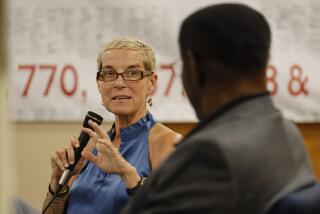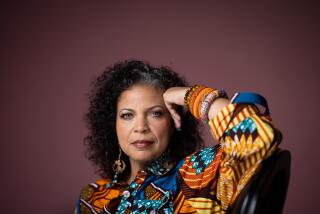Flame Still Burns for ‘60s Radical : Black history: Angela Davis calls for a new revolution. She says African-Americans have not been so oppressed since slavery.
- Share via
Black youths are caught up in a murderous cycle of violence and drugs that is symptomatic of perhaps the worst oppression of African-Americans since slavery, 1960s revolutionary leader Angela Davis said Thursday.
Speaking in a lilting voice before more than 500 students at Cal State Northridge--most of whom were toddlers when her name hit the headlines--Davis, 46, called for a new black revolution. Her appearance was part of the campus’ Black History Month celebration.
“We desperately need a form, an organizational form, that will magnetically attract our young people,” said Davis, her trademark Afro supplanted by a shock of dreadlocks stretching halfway down her back.
“If we don’t find that way, our young people will not survive,” she said. “We must find a way to transform that negative energy in our community into something positive, into something constructive, into something--mind you--revolutionary.”
Davis, twice the Communist Party’s candidate for vice president, said she hopes that the freedoms recently won in Eastern Europe and the Soviet Union will lead to a better socialism, not capitalism.
“I’m hoping that this upsurge will be a healing upsurge,” she said. “That a new and stronger socialism will emerge . . . the kind of socialism that will be an inspiration to us.”
Davis first gained national notoriety in 1969, when she was fired from a two-year teaching job at UCLA because of her membership in the Communist Party U.S.A. A year later, she was charged with murder, kidnaping and conspiracy because guns registered in her name were used in a Marin County courtroom shoot-out in which a judge and three convicts were killed.
The UCLA firing was upheld, but Davis teaches philosophy, aesthetics and women’s studies at San Francisco State University and the San Francisco Art Institute. The weapons charges later were overturned but only after Davis had spent 17 months in prison.
Davis said she fears that without an ethnic studies requirement for all college students, she and other black leaders will be forgotten. Already, she said, she sometimes hears people say, “Angela Davis, is she still alive?”
CSUN students, for the most part, are now the age Davis was in the mid-1960s, when a news photograph of Black Panthers marching with guns at the California Legislature drew her home from college-level studies in Germany.
“That image affected me . . . and I said, ‘I’m going home,’ ” she said.
James Henry, president of the Black Student Union at CSUN, who was only 2 when Davis was fired from UCLA, called her an inspiration. “She’s like a book that you don’t have to read now because you’ve heard her speak,” Henry said.
CSUN student Angela L. Davis, 22, introduced herself to her namesake after the speech. Her parents did not name her after the activist, the younger Davis said, but bearing the name forced her to be more aware of racial issues as she grew up in South-Central Los Angeles. She is a Pan-African studies major and wants to become a politician.
At 41, Valencia Shelton was one of the few students at Thursday’s speech who considers herself Davis’ contemporary. Shelton is working toward a master’s degree and teaching credential, resuming her education after careers as social worker and sheriff’s deputy.
“In all my classes I have to try to explain the black experience to other students,” said Shelton, who said she marched with Martin Luther King Jr. in Alabama when she was 15.
Punctuating her comments with statistics, Davis strove Thursday to illustrate the ways in which she said life for many American blacks is worse now than in King’s day, especially for black women.
But, she said, problems such as drug use, crime and welfare dependence are results--not the cause--of societal oppression. “We are witnessing a scourge of drugs like none that we have ever seen before,” she said. Crack use in the black community “is approaching genocidal proportions.”
But, she said, she does not blame the drug pushers, because they have few employment alternatives besides minimum wage jobs at fast-food establishments. Nor does she blame crack users, who she said studies show tend to be young black women, “for wanting to feel a little better in the midst of this misery.”
“The poor have become poorer. The depth of poverty has become much worse,” she said. “The situation for African-Americans is worse than . . . it has ever been in my lifetime.”
More to Read
Sign up for Essential California
The most important California stories and recommendations in your inbox every morning.
You may occasionally receive promotional content from the Los Angeles Times.













